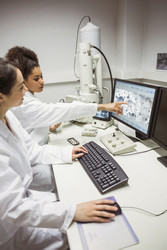In spite of unrest, ASREN continues to advance e-infrastructure for the Arab region
Speaking at the recent CHAIN-REDS final conference in Brussels, Dr. Abu-Ghazaleh, Chairman of the Arab States Research and Education Network (ASREN)(opens in new window), opened by paying tribute to the European Commission’s ‘continuing support of research and development in our region’. The EU-funded EUMEDCONNECT2 project, which ran from 2008 to 2011, was a catalyst for the formation and establishment of ASREN, which is now a principal partner of the current EUMEDCONNECT3 project(opens in new window). ASREN brings together Arab region National Research and Education Networks (NRENs) and their partners with the aim of implementing, managing and extending pan-Arab e-infrastructures for the research and education communities. It also works to boost scientific research and cooperation through the provision of e-infrastructures and e-services. Since its official foundation in 2011, the association has been involved in several EU projects, including CHAIN-REDS(opens in new window). This cooperation is helping the association to work towards its aim of ‘laying the foundation for a platform of seamless access.’ Dr. Abu-Ghazaleh noted, ‘Without European Commission funding, our efforts would still be incomplete.’ ASREN will also be a partner in AFRICACONNECT2 which begins this year. The work of ASREN is particularly important, according to Dr. Abu-Ghazaleh, given the huge population of young people – around 200 million – in the region: ‘E-infrastructure is a means to advance research and innovation and to enable opportunities for young researchers etc. Digital infrastructure is a key element of growth and important for access to knowledge, for example through e-learning.’ However, research and innovation efforts do not exist in a vacuum and Dr. Abu-Ghazaleh pointed to the challenges that the region faces such as a lack of resources and expertise and particularly the political instability that is currently dominating headlines. However, Dr. Abu-Ghazaleh is certain that the region is moving towards a new era: ‘Whatever instability we have, it is similar to what you had in Europe in dark ages. This is the beginning of the renaissance – like the one you enjoyed in Europe.’ He urged the EU to ‘help us to ride this wave and make this the Arab Renaissance’, insisting that ASREN has been continuously successful in achieving it aims in spite the challenges over the past few years. In fact, in November 2014, ASREN signed an agreement with DAMAMAX, one of the leading providers of communication services and broadband solutions, to connect ASREN to the GÉANT network in Europe, Internet2 in the US and other regional networks across the world. Under the agreement, a 155 Mbps link for research and education will be provided from Talal Abu Ghazaleh University in Amman to ASREN’s Point of Presence (PoP) that was recently established in London. Going forward, Dr. Abu-Ghazaleh imagines that the association will continue to bring together a mix of stakeholders and help to educate the next generation of leaders. He has a vision for creating a truly international university which would be a partner to all accredited universities in the world and deliver all programmes online. His aim is to expand the reach of learning and push boundaries: ‘Let’s democratise world-class education through the use of digital technologies.’ For further information, please visit: ASREN http://asrenorg.net/index.php(opens in new window) CHAIN-REDS https://www.chain-project.eu/(opens in new window)
Countries
United Arab Emirates, Austria, Belgium, Bulgaria, Cyprus, Czechia, Germany, Denmark, Algeria, Estonia, Egypt, Greece, Spain, Finland, France, Croatia, Hungary, Ireland, Italy, Jordan, Lebanon, Lithuania, Luxembourg, Latvia, Morocco, Malta, Netherlands, Oman, Poland, Palestine, Portugal, Qatar, Romania, Saudi Arabia, Sudan, Sweden, Slovenia, Slovakia, Somalia, Syria, Tunisia, United Kingdom



